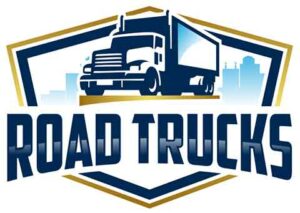Whether you want to haul your 4-wheeler or your large truck, there is a method for everyone how to properly and safely transport these vehicles. In this article, we will focus on car trailers and tow dollies. We will explore what’s the difference between them and which one to choose from. So, what are the differences, and which one of these should you choose?
Car trailers ensure vehicle safety and secureness for all travel while tow dollies provide quick and accessible, short-distance travel. Car trailers have accessibility to haul any vehicles compared to tow dollies. Both provide effective vehicle transportation depending on purpose and budget.
As you can see, car trailers seem to have the upper hand over the tow dollies in most cases, however, tow dollies are effective and useful in their own ways. Let’s further explore what purposes each serves and decide which scenarios would be best for each.
Contents
Tow Dolly
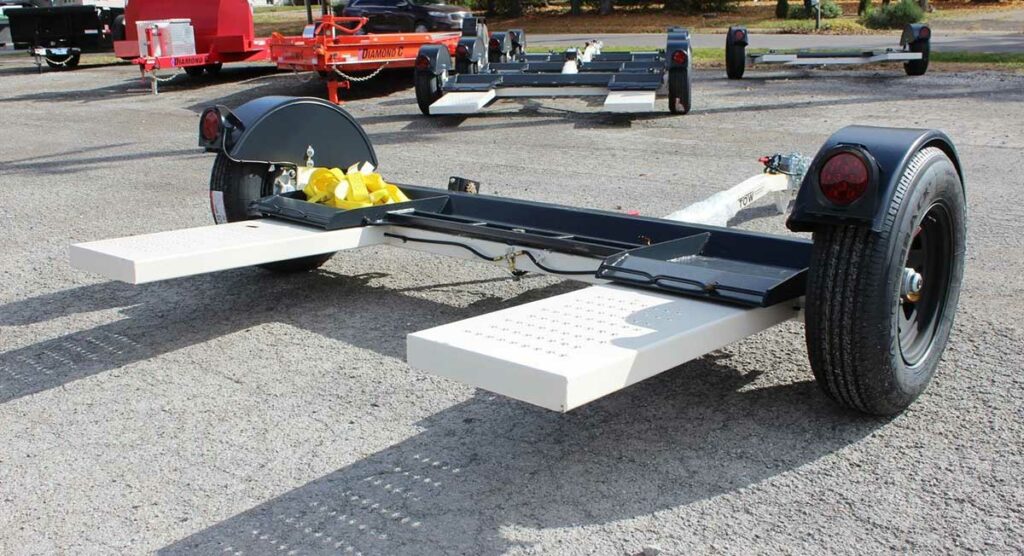
Starting with two dollies, this method of transportation is perfect for any situation that only requires a very short travel time and needs to find a cost-efficient solution.
With tow dollies, the front two wheels of the vehicle are mounted and securely fastened to the tow while the rear wheels remain on the ground during travel. It is important to note that effective transportation with a tow dolly will be primarily tailored to all front-wheel drive vehicles, though it can adjust for rear-wheel drive vehicles.
Tow dollies are handy solutions for getting quick vehicle loading and unloading in a frequent manner. Towing vehicle services, for example, will find this type of transportation handy as they are consistently taking requests to tow the customer’s vehicle and most are usually lighter in weight, therefore making it a convenient solution without breaking the budget.
Overall, tow dollies are there for both amateur and professional use which is affordable and convenient.
Car Trailer
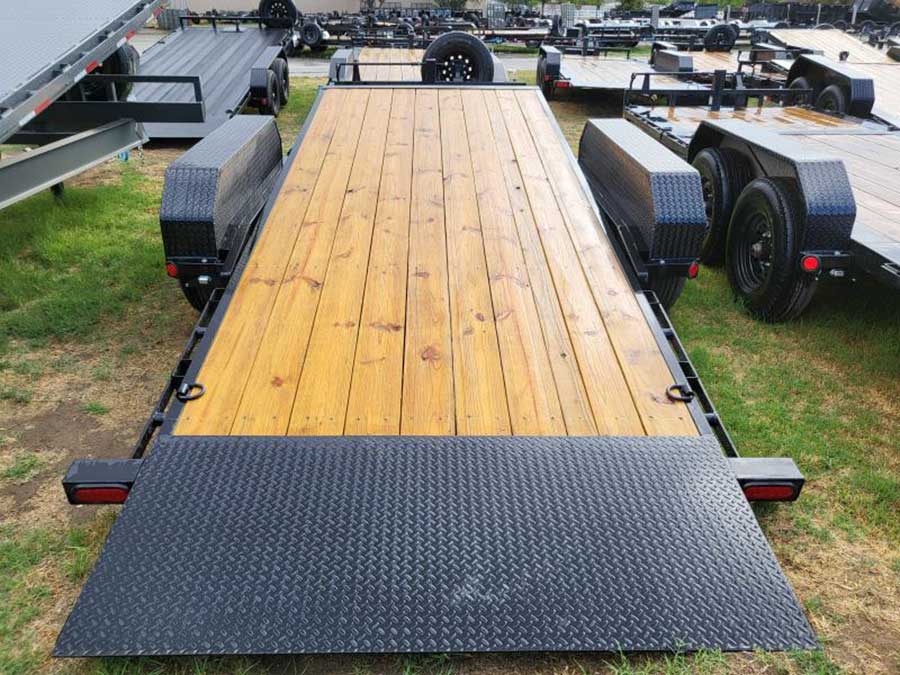
Shifting our focus briefly to car trailers, these forms of transportation have more durability and functionality compared to tow dollies, making it one of the best overall methods for any vehicle and situation.
For car trailers, rather than having the front two wheels being mounted with the rest of the vehicle making contact with the ground and essentially “dragged,” car trailers allow for the entire vehicle to be lifted from the ground and be fully secured and fastened on all sets of wheels.
Having a car trailer will mean that one will be making long travels that do not require consistent loading and unloading. Moving scenarios, for example, are perfect for owning a car trailer as a moving destination may be cross-country and one may need a method of transportation for other vehicles that will not be in use during the moving process.
Overall, car trailers’ functionality is for both short- and long-term travel, along with vehicles of any type and size being allowed to be towed with reduced issues and other hassles.
Weight Capacity

Now that we have addressed briefly what both a car trailer and a tow dolly are, let’s now briefly discuss the weight capacity of each one.
Because the tow dolly’s purpose is to transport lightweight vehicles, one must evaluate their own vehicle weight and size and determine whether it would be appropriate to haul it on a tow dolly. For general weight capacity estimates, a tow dolly can handle around 3,500 lbs. for a front-wheel drive vehicle. If one decides to use a tow dolly for a rear-wheel drive vehicle, a weight capacity of nearly 4,000 lbs. should be considered. Note, this does not involve the unloaded weight of around 550 to 750 lbs. of the two dollies alone.
For car trailers, distinction from front-wheel or rear-wheel drive vehicles will be arbitrary therefore allowing for more freedom to haul a vehicle heavier than what a tow dolly can handle. Aside from the unloaded weight of about 1,500 to 3,000 lbs., a car trailer can additionally haul up to around 15,000 lbs. Safe to say that the car trailer’s max weight capacity is far superior to the tow dollies due to the nature of its purpose. Overall, car trailers are the best choice for excellent heavy-duty purposes.
Travel Distances

Now that we have talked about the weight capacities for each, let’s continue with the travel distance that each can maintain and retain optimal functionality.
Starting with tow dollies, when unloaded, it is recommended in some cases that those with an unloaded tow dolly shouldn’t exceed 50 miles of travel. When loaded, check the vehicle and connections regularly.
We should also note that depending on the weight of the vehicle that is in tow will require the driver to drive slower than normal to reduce any risk and potential harm to the driver, others, and the vehicles. For towing with a tow dolly, it is highly recommended to travel max at 55 mph on highways.
Related Article: What Is The Speed Limit For a U-Haul Trailer?
Now with car trailers, it should be obvious when we say it will far exceed the tow dolly’s 50-mile limit and last longer regarding its build. Similar to tow dollies, towing a car trailer will also recommend one to drive at a max speed of 55 mph on highways. Though max travel distance isn’t clearly indicated, we can safely say that hauling a car trailer, loaded or unloaded, can easily exceed 100s of miles at a time, again, assuming that the car trailer is properly maintained and kept clean.
The max distance for both types of tows is cloudy and not yet clearly stated, but its distance will always be based on the weight and speed of the tow. Taking both speed limits and weight capacity, distances can vary heavily making it challenging to pinpoint an accurate estimate. Regardless of this, just note that tow dollies are only for extremely short travels while car trailers are meant for the long haul, traveling cross country if need be.
Types of Vehicles
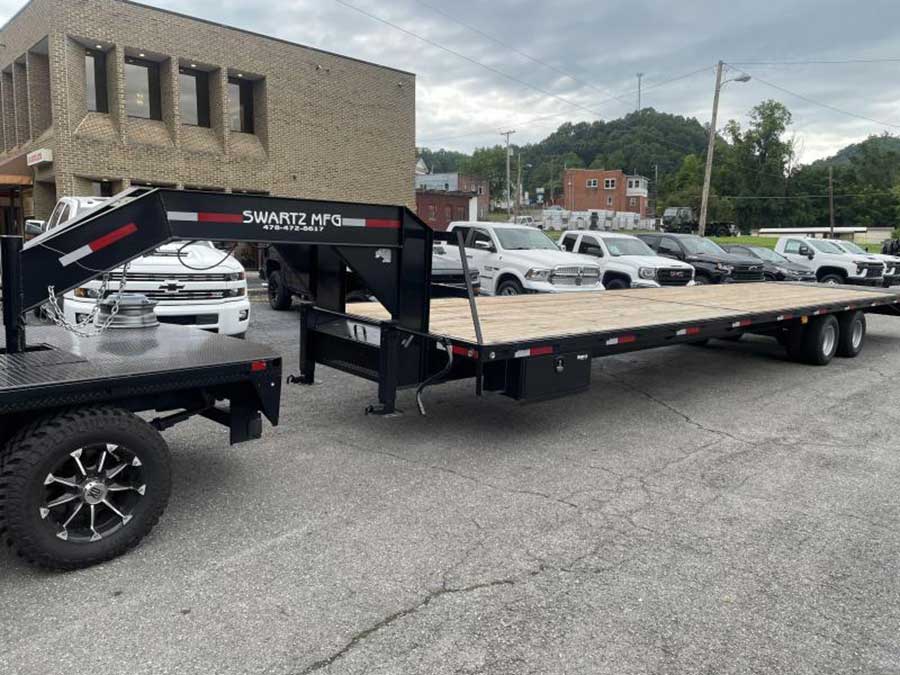
Before we move any further into the types of vehicles that may be hauled on either a tow dolly or a car trailer, let’s briefly mention the type of vehicle that can do the hauling. As we may have guessed or already know, trucks are perhaps the most superior vehicles used for towing in that they are purposed for these heavy-duty tasks.
SUVs or cars are capable of hauling as the tow but might exceeds the weight of the vehicle towing capacity. Trucks have the strength and size to compensate for such weight capacities and are the best vehicles to choose for getting the work done.
As for the vehicles that can be towed, with tow dollies, it is obviously apparent that cars will be the primary vehicles used for such tow. Even if we said that cars are the primary vehicles, we should also briefly understand that the weight on the front-wheel axle, or whatever axle is being mounted on the dolly, should only weigh around 3,000 lbs. The curb weight of the vehicle may also matter with a limit of 4,900 lbs. A vehicle that reflects these weight capacities can be towed with a tow dolly. But again, regular small cars are the most common vehicles used with tow dollies.
Car trailers far exceed tow dolly’s limits on what it can, rather than can’t, haul. Along with hauling cars, trucks, and SUVs are also options one may consider when using a car trailer. As we have said earlier, the max weight capacity of a loaded car trailer can reach up to 15,000 lbs. making it extremely diverse in what it can haul. Car trailers’ accessibility to haul a plethora of vehicles is very attractive and not limited compared to tow dollies.
Rental & Purchase Costs
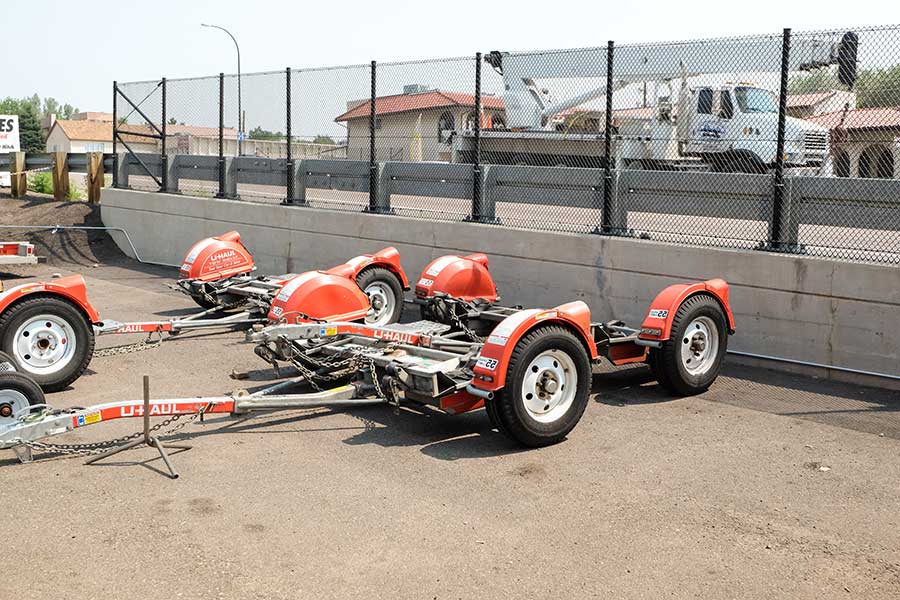
Let’s now talk about the costs each of them may be pried at, either for renting or buying,
Tow dollies are far cheaper than a car trailers. To rent a tow dolly, it will range from around $40 to $60 per day, and if one chooses to purchase a personal tow dolly for yourself, it will only range from $1,000 to $4,500. This is extremely affordable to have for the purpose of making short travels and will not break anyone’s budget.
For purchase, car trailers are far more expensive compared to tow dollies which can range from around $5,000 to nearly $12,000. These prices will need to be heavily considered when trying to invest in a car trailer as each provides its own unique builds and purposes. Regardless of some differences, they each all function the same: effectively hauling heavy loads. If choosing to rent, a price range of $200 to $400 for a standard long-distance move will be requested.
Though the prices may be cheap or costly, it will all depend on the individual and how often they may need this service. If you frequently move, regardless of the vehicles that need towing, owning one would seem to be more cost-efficient than spending on rental services. You have your own access to a tow dolly or car trailer, therefore, allowing for more freedom where and when to move and utilize each. If your moves are far in-betweens, renting shouldn’t be too much of a hassle, therefore saving a lot. This is helpful for those who also have no need for a personal tow dolly or car trailer.
In the end, tow dollies are cheaper compared to car trailers for both asking price values and rental values.
Types of Tow Dolly & Car Trailers

Before we go into the final verdict, we will just share some tow dolly and car trailer options to choose from if one does decide to pursue one or the other.
Though there isn’t an extreme distinction between tow dollies, there are excellent brands that feature some popular tow dollies with their own perks. When choosing a tow dolly, there are three that have been ranked as excellent quality in durability, accessibility, and other features such as hydraulic technology or rust-deterrent materials. These three are the Dethmers Manufacturing Company 9713045, Demco 9713947 Tow Dolly, and the Roadmaster Inc. Universal Tow Dolly.
When dealing with car trailers, they are unique in how many cars can be towed, how the platform tilts on uneven surfaces, and whether these car trailers have sidewalls. There are five distinct types of car trailers, some of which were just mentioned. These five are open (no sidewalls), enclosed, tilt, gooseneck (name from its hitch), and single-car trailers. Some popular manufacturing companies that employ these car trailers are Continental Cargo, Premier, and Kaufman to name a few.
Both types of tows have incredible quality and reputable brands tied to each. Consider exploring these brands and types when exploring for purchase or rent.
Final Considerations and Verdict
To conclude this article, let’s finalize each method of transportation and their brief pros and cons and officially decide which one to choose.
Tow dollies are perfect for quick and easy travels that do not require an extended journey. They are cheap and convenient for most people who are seeking a type of car transportation method. The only limitation of a tow dolly is the lack of accessibility when it comes to what vehicles can be towed by a tow dolly.
Car trailers, on the other hand, are diverse in their function and purpose. Not only can it do everything a tow dolly can do regarding weight capacity and travel distance, but it can also go beyond the tow dolly’s limitations. A plethora of vehicular options are widely available to tow with a car trailer making the car trailer an already desirable option for anyone who owns a vehicle beyond a standard car. Not only is it accessible to vehicles beyond cars, but it also protects the vehicle from making constant contact with the ground, plus eliminating mileage and fuel usage. Though costly, it provides a wide array of functions that far exceed tow dollies.
The final verdict, a car trailer is superior in every way possible. Despite the price, it will last longer and be very useful in nearly all travel situations.
